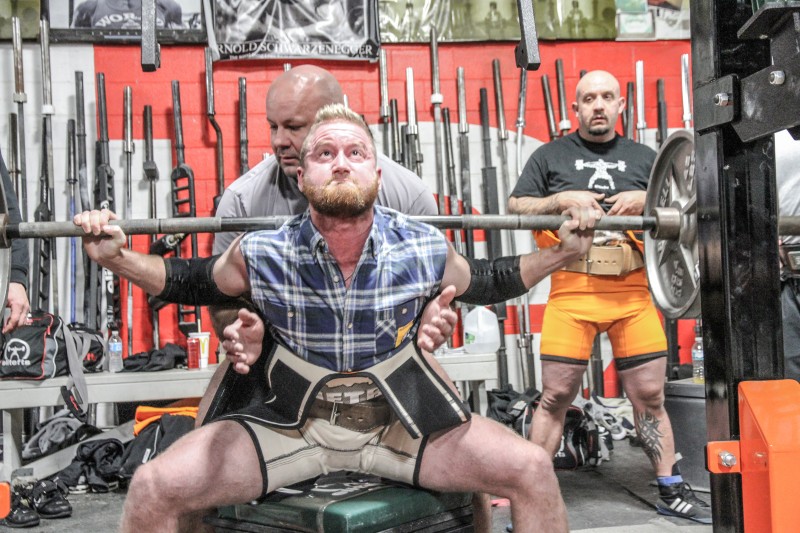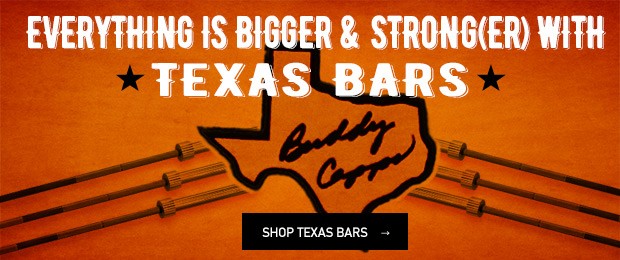
First, some background before I get into any explanation of what is going on here. Two months ago I made a decision to get ready and train for a powerlifting meet. My training had been going well, and my body and mind felt like it was ready to start pushing. I had not been in a meet in years, and now that my son has been training with me, I wanted to share the experience with him and let us enjoy maybe one final ride before I am too old and broken to do it again. I could write workouts for anyone but myself, so I decided to contact my old strength coach Kenny. I knew by contacting him and getting a workout, it was go time. No room for bullshit or halfway doing it — you are in or out, no matter if he is here or 2,000 miles away. That is what locked me in. We were in it together again. He asked me what I wanted to do and I said, "Simple, I just want to beat any total or lift I have ever done in competition." I told him where my strength was and he came up with the master plan.
WATCH: Motivational Rant at UGSS
I have fully converted my garage into an awesome weight room, and have all the gear I need. I bought a new boom box and bam, I was ready to go. The first four weeks felt pretty good, getting in some reps and muscle conditioning for a heavy cycle. And a heavy cycle it was. The second four weeks became the heaviest training cycle I have ever done. Every week, day, rep, and workout was a grind, both mentally and physically. But I will admit it has felt great hitting the weight and the reps that this workout had called for. It is hard, but doable if you are all in; I even started with belt and wraps for the first time in a long time.
And that is where the story begins.
I thought I had everything covered going in: equipment, space, schedule, program, music. But there was one thing that I took for granted with this training cycle, and that was a training partner. I had been training with a couple of guys and they were doing okay, then boom. Both went home for the holidays for two weeks, right in the middle of the heaviest two weeks of my life. Not only did I lose my wrap guy, I had no spotters to speak of. I just did my heaviest squat set for reps ever, wrapping myself (which blows), and being spotted by my 16 and 14-year-old daughters with the man counting reps. I had so much adrenaline knowing I had to make the lift or I was going to die that I had no choice but to make all the reps. I was living the quote, "If it doesn’t scare you, it isn’t heavy enough."
I don’t recommend this to anyone else, but as I have stated before, if it’s on the paper for that day, you've got to do it — period! Having training partners may not seem like a big deal to many of you, and if it doesn’t, it is because you have never had great ones! This last week has brought back a ton of memories of great training partners that I have had, how important they are, and how much they mean to me. There is a huge difference between working out with someone and being a training partner.
This is where the parallel universe comes in. Being a great training partner is being a great teammate. Whether it is being a collegiate athlete or on a powerlifting team, do you work out with your teammates or are you training with them?
I am always looking into why teams win. No matter the sport, venue, business, you name it, I am constantly asking myself what they are doing to win. What is their formula? What is their culture? I find myself looking back to the really successful teams I have had the pleasure of coaching to see why we won.
After these last two weeks, one of the biggest patterns that I have come across is that the difference between working out with someone and training with someone has a bigger role in success than I thought. The great teams, athletes, and lifters I have been around were all great teammates, and had great teammates around them. When I set up workout groups, I take a bunch of things into consideration. They have to be near the same size, strength level, and temperament. I try as hard as I can to match them up with a strength coach that has the same temperament as the group of players so they can get the most out of them. They are the head coach of their particular group, and we all try to get the same job done one way or another. Some athletes or people don’t respond well to you getting in their face and challenging them, while others relish in it. Whatever the case, we are constantly trying to match up players and coaches to build a winning culture of training together and holding each other accountable so that we all get better.
MORE: Building A Great Lifting Crew — Advice for Hardcore Lifters
What I've found looking back is that the winning teams had groups that knew how to push each other. They all had strengths and weaknesses and knew how to push each. If one was weaker in the bench but owned incline dumbbell press, the others would push him on the bench and he would push them on incline dumbbell press, and on and on and on.
When I first started training at Kenny’s gym and was getting ready for my first meet, he had a rule. There were usually 25 of us getting ready for the same meet. Every weight class and every strength level was represented, from beginners to national champions. Sunday was squat day, and you could imagine what it was like getting 25 lifters through a fully-equipped squat workout.
It was run like a meet: Ken would write down the weights you had to do that day and ran it into flights. His rule was that everyone lifting had to bring a non-lifter with them. The guys from the gym that were not going into the meet were there to spot and load, and you had to provide your own person to help with wraps, suit, etc. After a couple of sessions, it was amazing how tight you became with your training partner even though he was not training. He knew what music to play at what time in the ride to the gym, how you like to be wrapped, which side of the suit you pull up first, warm-up attempts — all of those things. A great teammate.
The next meet was his turn and I did all of that for him — my first taste of coaching, and I got hooked from there. I have helped people write workouts, but never really coached until then. It was the same way with some of the staff teams that I worked with; we had some unbelievable workouts and pushed each other to the max every day. And we all got better because we were great teammates.
The parallel I am trying to draw from this trip down memory lane is simple: As a coach or a lifter, are you a good teammate? Are you fostering a winning culture in your weight room by showing your athletes the value of them pushing each other to improve the whole team? Once you see them coaching and challenging each other, and your coaches adding fuel to that fire, you will see a huge change in them. They won't be working out anymore. They'll be training to win.












1 Comment